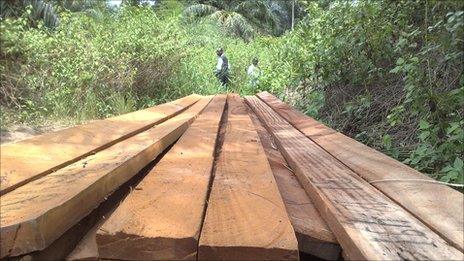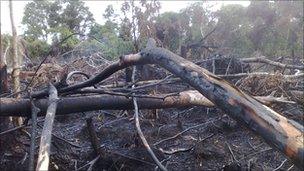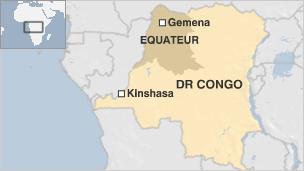Lumberjacks carve a living out of DR Congo rainforests
- Published

Simon Kesangana used to be an assistant nurse in a hospital in the Democratic Republic of Congo, but he gave up his poorly paid job to become a lumberjack.
Without wearing gloves or shoes, he works with a team of woodcutters at the edge of the rainforest sawing trunks from large trees into rafters for use by the local construction industry.
Afterwards they carry the planks out of the forest one by one, on their heads.
DR Congo has the world's second largest area of rainforest after Brazil - about 150 million hectares of dense forest - and boasts half of Africa's rainforests.
But there is widespread concern about how to protect them in this huge, war-ravaged country where the state is struggling to impose its writ.
The deforestation rate is estimated to be 0.2% each year.
The government is trying to preserve its natural wealth and has cancelled concessions covering some 10 million hectares of land.
But campaigners fear that illegal logging will continue to ravage the forests in a country where most of the population lives in extreme poverty.
Mr Kesangana's new job is not making him rich, but at least he knows what he is getting and when - unlike when he was employed by the weak Congolese state.
"We don't get paid a salary, we get to keep some of the timber products and we can sell them for our own survival," he says.
"We produce 100 to 120 pieces per week and we can keep three pieces each, and sell them for 12,500 Congolese francs ($14, £8)."
This is a common arrangement in Gemena district in north-western Equateur province.
Each worker gets about 3% of production, the landowner 2% and the trader - who provides the equipment - pockets the rest, says Felicien Topwa from the non-governmental organisation Natural Resources Network.
'Turned into savannah'
On the 7km (about four miles) of road between the village of Botuli and the logging site, there are no trees left.
"All this used to be forests where you could hunt and gather forest produce," says Mr Topwa.
"But now, deforestation has happened and it all turned into savannah."
All the logging in this corner of the DR Congo is done by lumberjacks like Mr Kesangana.
But further south, near the main export routes connected to the Congo River, industrial companies have been active for decades.
With peace returning to DR Congo and promises of better infrastructure in the coming years, more investors are interested in exploiting the rainforest or turning it into large plantations, including for biofuel production.
Fabien Nyingba, assistant commissioner in charge of economic affairs for Gemena, is sceptical about whether they should be welcomed.
"What can they in turn offer to improve the living conditions of the population?
"We saw them in Pumba, in the Mongala district. Now the forest there has been depleted and the population still lives in abject poverty," he said.

The government has a moratorium on new industrial logging concessions
"Planning industrial logging is not necessarily bad but it needs to be controlled and associated with permanent reforestation."
Since new forestry legislation was passed in 2002, the government has maintained a moratorium on new industrial logging concessions.
It is not supposed to be lifted until conditions are met for the law to be implemented properly.
Jose Endundo, the Congolese environment minister, says this is unlikely to happen within the next year.
"The real problem is not industrial logging, it is illegal logging. We now want to clean up the sector entirely, improve controls, and then we will see," he said.
Contracts cancelled
Before a government review of all contracts, which ended earlier this year, there were 22 million hectares of industrial logging concessions, he said.
But 10 million hectares were found to be incompatible with the Forestry Code and cancelled.
Despite the government review, some campaigners feel it will be a lot longer before everything is compatible with the new law.
"Most operators active in the past have seen their title legalised," says Jerome Frignet from the environmental group Greenpeace.

"The low governance, corruption problems, the lack of consideration of local communities in awarding titles forest titles, all those problems remain the same.
"The situation will probably not be ripe for lifting the moratorium before at least another 10 years."
A World Bank-funded programme to monitor the timber trade with paper trails, boat patrols and satellite imagery has begun, but is not yet fully operational.
A recent rainforest summit in neighbouring Congo-Brazzaville called for more funding in the fight against climate change
But for the time-being, environmentalists and civil servants in Gemena say the sector remains plagued with fraud and logging companies, however small, do not meet their reforestation obligations.
Mr Kesangana is aware that he is contributing to the problem but says he has little choice - for him the immediate problems of feeding his family trumps any concerns about the future.
"Two or three years ago, we found forests close by. Now we need to move 10km further. This is bad.
"We are aware that our children will have serious difficulties because there will no longer be any forest."